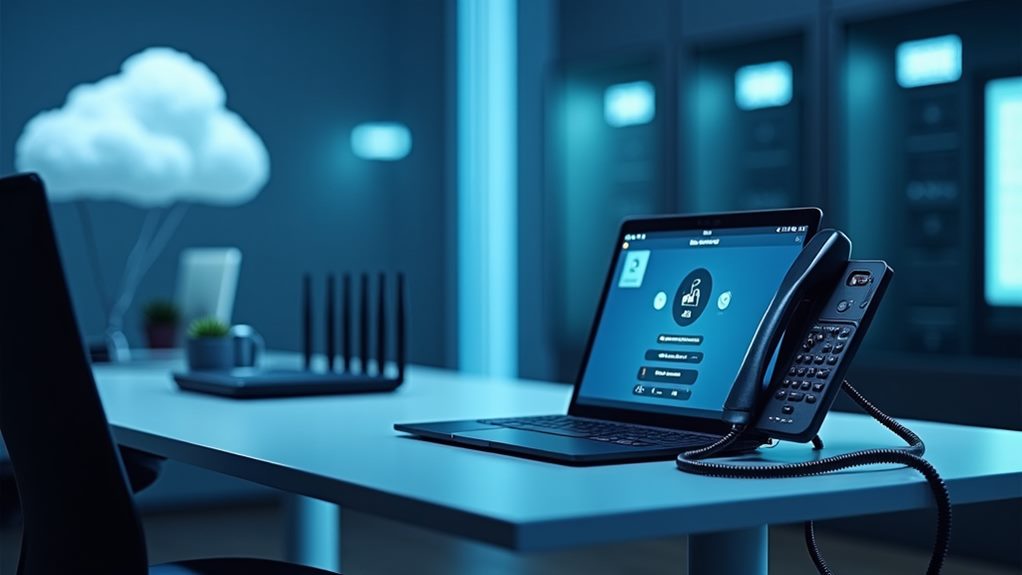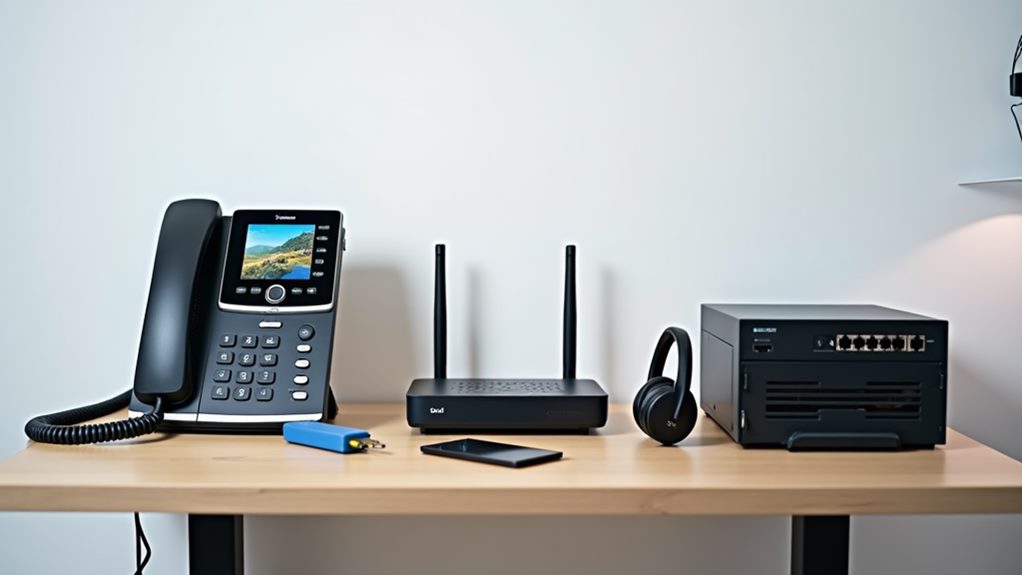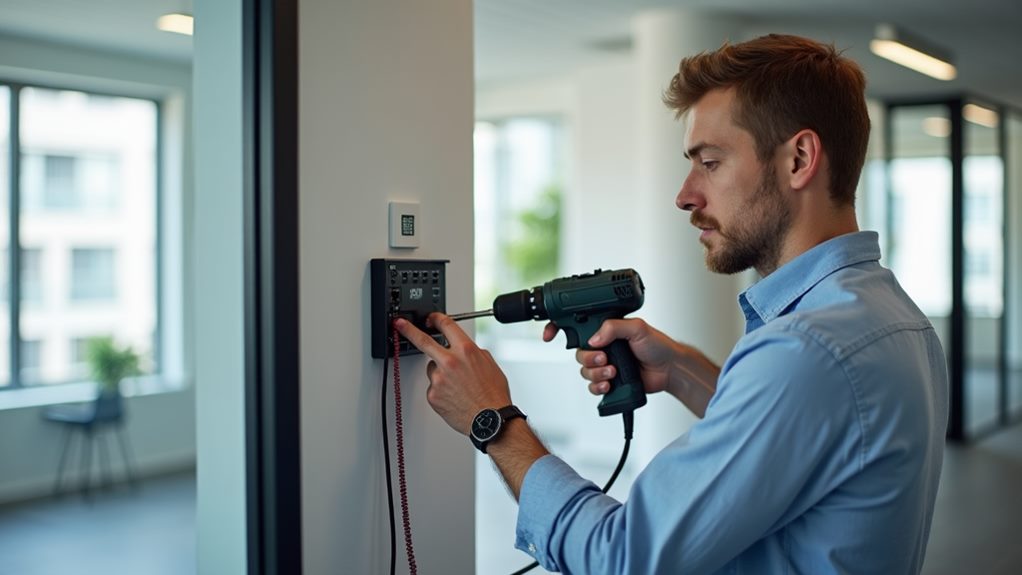Business VoIP costs typically range from £5 to £40 per user monthly, with thorough UK plans starting at £10.95 to £24.95. You'll need to factor in essential hardware like VoIP-compatible phones (£35-£300) and headsets (£20-£200), plus Analogue Telephone Adaptors (around £100) if you're integrating existing phones. Initial setup costs and reliable broadband service (£15-£50 monthly) are vital investments for ideal performance. Your business can expect to save 30-50% compared to traditional phone systems, with potential first-year savings exceeding 60%. Understanding the complete cost structure will help you maximize your VoIP investment's value.
Understanding VoIP System Components

When setting up a business VoIP system, you'll need several core components working in tandem to guarantee seamless communication. At the heart of your VoIP phone systems, you'll find cloud-hosted services that manage your calling infrastructure, eliminating the need for traditional phone lines while reducing VoIP costs considerably. This modern approach allows businesses to save over 60% in their first year, making it an attractive alternative to legacy systems.
Your essential components start with a robust broadband connection, which serves as the foundation for maintaining superior call quality, allowing businesses to capitalize on notable savings. Most VoIP providers recommend connections ranging from £15 to £50 monthly, depending on your business requirements.
You'll also need VoIP-compatible phones, which come in various models starting at £35 for standard units and reaching £300 for advanced executive versions.
To integrate existing analog phones into your new business phone setup, you'll require Analogue Telephone Adaptors (ATAs). These devices convert traditional phone signals into digital data that your VoIP system can process.
Additionally, quality headsets are vital for team members who handle frequent calls. When combined, these components create an extensive communication ecosystem that supports modern features like call recording, CRM integration, and unlimited inbound calls, ensuring your business stays connected and competitive in today's digital landscape.
Monthly Service Plan Costs
Monthly service plans for business VoIP systems typically range from £5 to £40 per user, with extensive packages offering tiered pricing based on feature sets and call volumes. VoIP can save small businesses up to 60% on phone bills compared to traditional systems, making it a financially sound choice in today's market.
You'll find that thorough VoIP plans from leading providers in the UK start at £10.95 to £24.95 per user, making them more cost-effective than traditional phone systems. When selecting your service plan, you'll need to factor in line rental costs, which can add £10 to £50 per user monthly to your total expenditure.
Providers like Gamma offer competitive packages starting at £9.95, including 2,000 free landline and mobile minutes, which can greatly reduce your communication costs. Your monthly service plan costs will vary depending on the extra features you require, such as call recording, virtual receptionist, or advanced features that enhance business communication strategies.
Before committing to a plan, you'll want to analyze your business's calling patterns and feature requirements. Many providers offer scalable solutions that let you adjust your plan as your needs change.
Remember to account for any additional hardware costs, such as VoIP-compatible phones (£35-£300) and headsets (£20-£200), when calculating your total investment.
Equipment and Hardware Requirements

You'll need to budget for essential VoIP hardware components, including business-grade IP phones that range from £35 for basic units to £300 for advanced models, and specialized headsets costing between £20 and £200.
Investing in VoIP hardware enhances cost savings and operational efficiency for small businesses.
When shifting from traditional telephony, you can integrate existing phones using Analogue Telephone Adapters (ATAs) at approximately £100 per unit.
Your total equipment investment will depend on your specific needs, scaling from basic setups with minimal hardware to extensive systems requiring multiple devices and accessories.
Essential Phone System Components
Setting up a business VoIP system requires several essential hardware components that work together to enable seamless voice communications.
You'll need to invest in VoIP-compatible phones, which range from £35 for basic models to £300 for executive versions, depending on your specific requirements. A reliable broadband connection serves as the foundation of your system, with monthly costs between £15 and £50 based on speed and provider selection.
For a thorough VoIP setup, you'll need these core components:
- VoIP-enabled desk phones or headsets (£20-£200 for headsets)
- Analogue Telephone Adaptors (ATAs) at approximately £100 if converting traditional phones
- High-speed internet infrastructure with sufficient bandwidth
Initial setup costs vary based on your chosen configuration and installation requirements.
When planning your VoIP system budget, consider both the immediate hardware investments and ongoing connectivity costs.
The flexibility of VoIP systems allows you to scale your equipment choices according to your business needs, whether you're equipping a small team or a large enterprise.
Your choice of components will directly impact call quality and system reliability, making it vital to select hardware that aligns with your communication demands.
Hardware Cost Comparisons
The selection of VoIP hardware represents a significant portion of the initial system investment, with costs varying dramatically based on equipment quality and quantity.
When planning your hardware investment, you'll need to take into account several essential components that directly impact your system's functionality and user experience.
VoIP-compatible phones form the backbone of your communication setup, with prices ranging from £35 for standard models to £300 for advanced executive options.
You'll also need to take into account VoIP headsets, which start at £20 for basic versions and can reach £200 for premium models offering enhanced audio quality and comfort.
If you're integrating existing phone systems, analogue telephone adaptors (ATAs) at approximately £100 each will be necessary for seamless connectivity.
Don't forget to factor in your broadband costs, which typically range from £15 to £50 monthly depending on your speed requirements and provider choice.
Your initial setup costs will vary based on your specific equipment selections and installation requirements.
Internet Connectivity Considerations
Reliable internet connectivity forms the backbone of any successful business VoIP implementation. When shifting to VoIP services, you'll need to guarantee your internet connection meets the demanding requirements for crystal-clear call quality. Ultra-fast fibre optic broadband isn't just a luxury—it's essential for maintaining professional communications through your VoIP phone system.
Monthly broadband costs typically range from £15 to £50, an investment that's vital for your VoIP infrastructure. A dedicated internet connection helps prioritize voice data and prevents disruptions that could impact your business operations.
To maximize your VoIP performance, consider these important factors:
- Connection Speed: Confirm your broadband package provides sufficient bandwidth to handle your expected call volume.
- Service Reliability: Research local internet service providers' uptime guarantees and support capabilities.
- Network Dedication: Implement a separate connection exclusively for VoIP traffic to maintain consistent call quality.
Before implementing VoIP services, evaluate your area's internet connectivity options thoroughly. Poor broadband quality can result in dropped calls and latency issues, directly affecting your business's communication effectiveness.
Your choice of internet service provider will greatly influence your VoIP system's success, making this decision as important as selecting the VoIP provider itself.
Setup and Installation Expenses

Initial setup costs comprise a substantial portion of your business VoIP investment, with expenses varying dramatically based on your organization's scale and requirements.
When planning your VoIP phone system installation, you'll need to account for several essential components that impact your total expenditure.
Your primary hardware expenses will include VoIP-compatible phones, which you'll find ranging from £35 for standard models to £300 for advanced executive versions.
If you're planning to integrate your traditional phones into the new system, you'll need to factor in Analogue Telephone Adaptors (ATAs) at approximately £100 per unit.
Additionally, your team members may require VoIP headsets, with costs spanning from £20 for basic units to £200 for premium options.
Don't overlook the necessity to upgrade your internet infrastructure to support your new system effectively.
You'll likely need to invest in enhanced broadband service, adding £15 to £50 to your monthly expenses.
When you combine these elements, your total setup and installation expenses can range from a modest £100 for basic configurations to several thousand pounds for extensive enterprise-level implementations.
Comparing Provider Pricing Packages
Business VoIP providers offer distinctly tiered pricing packages ranging from £5 to £40 per user monthly, letting you select a plan that aligns with your operational requirements and budget constraints.
In the UK market, you'll find extensive options like Gamma Standard, offering competitive packages between £9.95 to £22.95 per user, which include 2000 free landline and mobile minutes.
When evaluating VoIP pricing structures, consider these essential factors:
- Monthly per-user costs, with providers like Vonage Select starting at £9 for basic features
- Included minutes and communication channels, such as Gamma's broad free minute allowances
- Value-added features like advanced call routing, analytics, and integration capabilities
You'll find providers like Voipfone offering free trial periods, allowing your business to test their features before commitment.
Enterprise-grade solutions from CloudTalk and Cisco Unified Communications start at $25 per user monthly, delivering robust feature sets for scaling businesses.
When comparing packages, focus on matching your communication needs with provider offerings, ensuring you're not paying for unnecessary features while securing essential functionalities for your operations.
Long-Term Cost Savings Analysis

Thorough analysis of VoIP cost savings reveals that organizations can reduce their communication expenses by 30-50% compared to traditional phone systems. When you're evaluating long-term savings, you'll find that VoIP is cheaper not just initially, but consistently over time. Monthly costs typically range from £5 to £40 per user, making it the best choice for businesses looking to optimize their communication budgets.
To maximize your long-term savings, you'll want to focus on strategic implementation. Many providers offer unlimited packages to make and receive calls at fixed rates, eliminating unpredictable monthly charges. Your team can benefit from advanced features while maintaining cost efficiency through careful provider selection and contract management.
While you might need to invest in upgraded broadband initially, this investment typically pays off through improved call quality and reliability. Consider that your long-term savings potential increases when you avoid unnecessary contracts and select a provider that aligns with your specific needs.
Final Thoughts
Business VoIP costs will vary dramatically based on your specific needs, but you'll typically find monthly per-user pricing ranging from $20-$60. While initial setup and equipment expenses might feel like you're climbing Mount Everest, your long-term ROI through reduced call costs, unified communications, and scalability makes the investment worthwhile. When you factor in enterprise features and seamless integrations, VoIP's TCO consistently outperforms traditional telephony systems.

